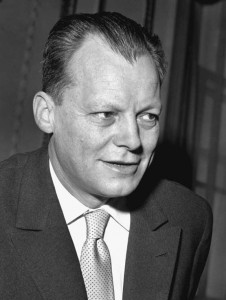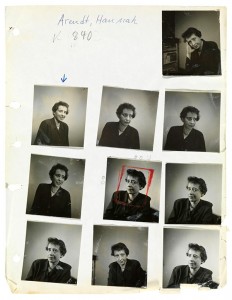“Hello. My name is Fred Stein, I’m a photographer, left-wing, and I would like to take your picture.”
This is how Fred Stein used to strike up a conversation with people he hoped to portray. Between 1933 and 1967 he managed to make more than 1,200 portraits this way. The words show he had not only the courage to approach people, but also a talent for quickly putting those who had caught his eye at ease.
Fred Stein took a passionate interest both in those he portrayed and their work. With André Malraux, Arthur Koestler, Egon Erwin Kisch, and countless other peers he discussed the political landscape in Europe of the 1930 and 40s. Willy Brandt and he became firm friends and remained so all their lives long, and likewise others whose portrait he made. In a letter of 10 May 1983, Brandt recalled:
“I met Fred Stein when we were both refugees and fighting the totalitarian Nazi regime with the rather modest means at our disposal. He was a man ahead of his time, an avant-garde and brilliant photographer, inspired by the commitment to justice and concern for truth so clearly reflected in his photographs. As his choice of characters and motifs proves without a shadow of a doubt, he was a true visionary.”
In an interview published two years earlier, Lilo Stein mentioned that her late husband, who died in 1967, had sought to show people not in a good light but in the right light. And this comment clearly puts the finger on the photographer’s intent: to create a psychological portrait, to be authentic, and to take an honest interest in his subject was the quintessence of Fred Stein’s work. His photographic portraits are neither set up nor staged; rather, they capture those moments that may ensue when a special bond exists between the photographer and subject.
Numerous people had Fred Stein take their portrait not just once but several times over the years – among others, Hannah Arendt, whose work Fred Stein greatly admired. In his letter to Arendt of 18 February 1964, he wrote:
“Your Eichmann report is invaluable not only because it continues to prompt debate, long after the trial is over; in terms of its subject matter and tone, it also maintains a great sense of urgency and responsibility in almost every line […]. A more objective historical voice than mine will surely praise it unreservedly in the very near future.”
Hannah Arendt’s reply of 9 March 1964 was likewise complimentary:
“[…] It is my honest opinion that you are one of the best contemporary photographers around.”
The exhibition, “In an Instant” presents sixty photographic portraits that clearly reveal Fred Stein’s flair for psychological insight.
Jihan Radjai, co-curator of the exhibition

